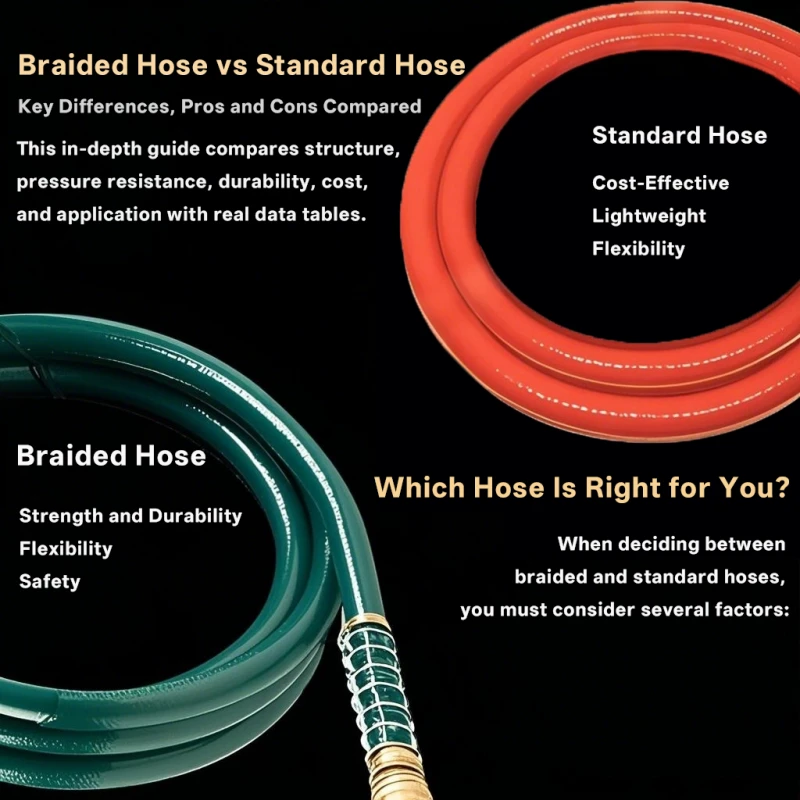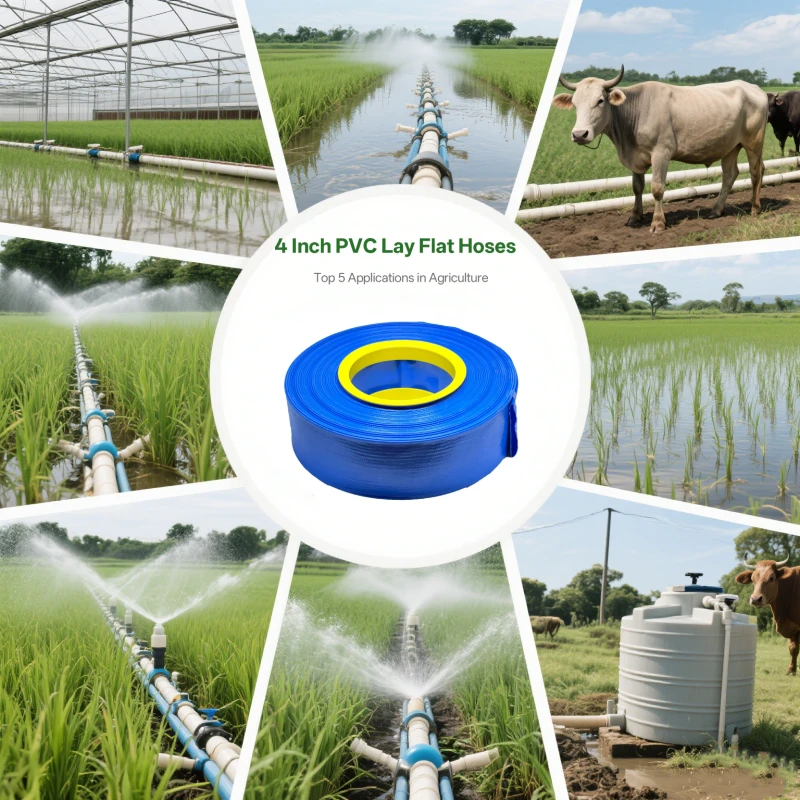PVC Suction Hose vs PVC Steel Wire Hose: How to choose the righe hose?
Many friends cannot distinguish the difference between PVC suction hose and PVC steel wire hose, and do not know under what circumstances to choose which PVC HOSE. Today we will explain in detail the differences between PVC suction hose and PVC steel wire hose and provide recommendations on how to choose them.
In industrial, agricultural, construction, and household applications, PVC hoses are widely favored for their lightweight, corrosion-resistant, and cost-effective properties. However, different types of PVC hoses are suitable for different scenarios, with PVC Suction Hose and PVC Steel Wire Hose being the two most common types. This article provides a professional comparison across multiple dimensions—including materials, structure, performance, and application scenarios—to help users make informed decisions.
1. Structure and Material Comparison
1.1 PVC Suction Hose
PVC suction hoses are primarily used for liquid transfer under negative pressure (vacuum). Their structural features include:
Inner layer: Smooth PVC to reduce fluid resistance and prevent deposits.
Reinforcement layer: Typically reinforced with spiral fibers or steel wires to enhance collapse resistance.
Outer layer: Wear-resistant and weatherproof PVC to protect against external environmental factors.
Pressure suitability: Mainly designed for negative pressure (vacuum), with limited positive pressure resistance.
1.2 PVC Steel Wire Hose
PVC steel wire hoses are designed for high-pressure liquid or gas transfer. Their structural features include:
Inner layer: Smooth PVC for optimized fluid transfer efficiency.
Reinforcement layer: High-strength spiral steel wires (usually copper-plated or galvanized) for superior pressure resistance.
Outer layer: UV-resistant and corrosion-proof PVC, suitable for outdoor or harsh environments.
Pressure suitability: Can withstand high positive pressure (typically 0.3MPa–1.0MPa) but is unsuitable for vacuum applications.
| Feature | PVC Suction Hose | PVC Steel Wire Hose |
|---|---|---|
| Reinforcement | Fibers/fine steel wires | High-strength spiral steel wires |
| Pressure Suitability | Negative pressure (vacuum) | High positive pressure |
| Collapse Resistance | Strong | Weak (for positive pressure) |
| Flexibility | Good | Moderate (limited by steel wires) |
2. Performance Comparison
2.1 Pressure Resistance
PVC Suction Hose: Designed for negative pressure, preventing collapse during suction (e.g., water pumps, sludge suction), but weak in high-pressure applications.
PVC Steel Wire Hose: Suitable for high-pressure transfer (e.g., pressure washers, air compressors) but may deform under vacuum.
2.2 Wear and Weather Resistance
PVC Suction Hose: Thicker outer layer for better abrasion resistance, ideal for ground dragging or rough environments.
PVC Steel Wire Hose: Steel reinforcement enhances pressure resistance, but frequent bending may cause outer layer cracking.
2.3 Temperature Tolerance
PVC Suction Hose: -10°C to +60°C (may soften at high temperatures).
PVC Steel Wire Hose: Similar range, but steel may become brittle in extreme cold.
2.4 Flexibility and Portability
PVC Suction Hose: More flexible, easier to coil and transport.
PVC Steel Wire Hose: Less flexible due to steel reinforcement, with a larger bending radius.
3. Application Scenarios
3.1 PVC Suction Hose Applications
Agricultural irrigation: Water pumping, drainage.
Wastewater treatment: Sewage trucks, septic tank cleaning.
Industrial vacuum suction: Particle/material transfer, dust collection.
Not suitable: High-pressure water/gas transfer.
3.2 PVC Steel Wire Hose Applications
High-pressure cleaning: Car wash machines, pressure washers.
Air compressor supply: Pneumatic tools in factories.
Construction water supply: High-pressure water pumps.
Not suitable: Vacuum suction or frequent bending.
4. How to Choose? Professional Recommendations
4.1 Choose PVC Suction Hose When:
Liquid suction is required (e.g., pumps, sludge suction).
Working in negative pressure (vacuum) conditions.
Flexibility and collapse resistance are priorities.
4.2 Choose PVC Steel Wire Hose When:
High-pressure liquid/gas transfer is needed (e.g., pressure washing, air compressors).
High pressure resistance and burst-proof performance are required.
Fixed installation with minimal bending is preferred.
4.3 Other Considerations
Cost: Steel wire hoses are generally more expensive.
Lifespan: Steel wire hoses last longer under high pressure; suction hoses excel in vacuum environments.
Maintenance: Steel wire hoses may rust if the outer layer is damaged—regular inspection is advised.
5. FAQ
Q1: Can PVC steel wire hoses be used for suction pumps?
A1: No, their structure is designed for positive pressure and may collapse under vacuum.
Q2: Can PVC suction hoses handle high pressure?
A2: Not recommended—they are designed for suction, not high-pressure resistance.
Q3: Which hose is better for long-term outdoor use?
A3: PVC steel wire hose, due to superior UV and weather resistance. PVC suction hoses are better for mobile use but may degrade under prolonged sun exposure.
Q4: What is the temperature range for these hoses?
A4:PVC suction hose: -10°C to +60°C.
PVC steel wire hose: Similar, but steel may become brittle in extreme cold.
Q5: Will PVC steel wire hoses rust?
A5: Yes, if the outer layer is damaged and the steel is exposed to moisture (especially uncoated wires).
Q6: Which hose is more flexible?
A6: PVC suction hose—easier to bend and coil. Steel wire hoses are stiffer.
Q7: Which hose is best for agricultural irrigation?
A7:Suction (e.g., water pumps): PVC suction hose.
High-pressure/long-distance transfer: PVC steel wire hose.
Q8: Is there a significant price difference?
A8: Yes, steel wire hoses are typically more expensive due to their reinforced structure.
Q9: How to extend hose lifespan?
A9:Avoid prolonged sun exposure or extreme temperatures.
Drain liquids after use to prevent internal corrosion.
Minimize bending/kinking (especially for steel wire hoses).
Regularly inspect for cracks or exposed wires.
6. Conclusion
| Requirement | Recommended Hose |
|---|---|
| Vacuum suction (pumps, sludge) | PVC Suction Hose |
| High-pressure transfer | PVC Steel Wire Hose |
| Flexibility/portability | PVC Suction Hose |
| Fixed installation/high pressure | PVC Steel Wire Hose |
When choosing PVC suction hose and PVC steel wire reinforced hose, it is necessary to determine according to specific application requirements:
If used for suction (such as water pumps, sewage suction, vacuum environments), PVC suction pipes are preferred as their anti collapse design ensures stable operation.
If used for high-pressure transportation (such as high-pressure cleaning, air compressors, building water supply), PVC steel wire reinforced hoses should be selected, and their steel wire structure can withstand high positive pressure.
For long-term outdoor use, it is recommended to choose steel wire reinforced hoses (with better weather resistance), while water suction pipes are more suitable for frequent movement or bending scenarios.
In terms of cost, suction pipes are more economical, while steel wire pipes are suitable for high budget and high durability needs.
Key point: First, clarify the usage scenario (positive/negative pressure, pressure level, environment), and then match the hose type to extend its lifespan and improve efficiency.
Choosing the right one can not only improve efficiency, but also extend the lifespan of hoses and reduce maintenance costs. I hope this article can help you make professional decisions!

